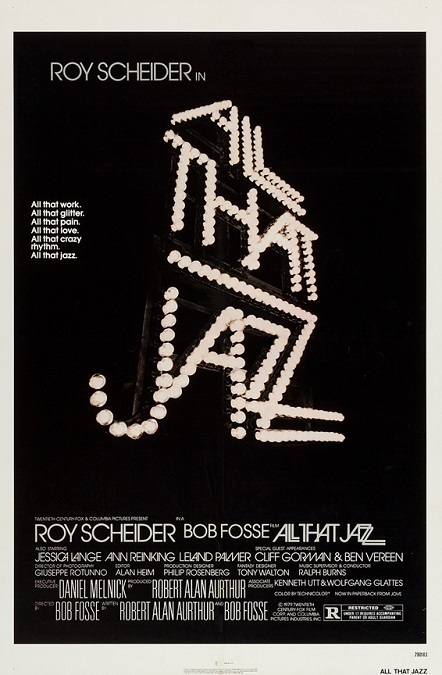
All That Jazz – 1979
I had been looking forward to seeing this movie for a number of reasons. I like Bob Fosse, I love his choreography, I have seen a few stills from the film, and they all looked interesting. I also happen to be a Roy Scheider fan. But for the most part, I think I was a little underwhelmed. Don’t get me wrong. I thought it was a good film, but maybe I was just expecting too much.
This was a movie written and directed by Bob Fosse, and was about Bob Fosse. It was a musical fantasy with surrealistic sequences in which the Bob Fosse character, Joe Gideon, played by Scheider, who really did a wonderful job in the role, has meaningful conversations with the Angel of Death, listed in the credits as Angelique, played by a very young Jessica Lang.
The film is about how Joe is a man who lives a life of obsessions and addictions. He is a workaholic, a perfectionist, an egomaniac, a drug user, a chain-smoker, and a sex addict. He lives hard and fast, driving himself toward an inevitable heart attack. When it comes, he goes into the hospital and the final fantasy sequence begins in which he sees himself in a glitzy film production. He is wearing a sparkly, sequined costume, standing next to himself in the hospital bed with tubes coming out of his nose and mouth.
In this show, people from his real life show up and go into song and dance numbers about how they want him to live. But when he does not, he goes into his final number, a duet with Ben Vereen as O’Connor Flood. They sing the song Bye-Bye Life. For those of you who don’t know the lyrics of the original song, they go, “Bye-Bye, Love. Bye-Bye, Happiness. Hello, Loneliness. I Feel Like I could die.” Instead Joe sings, “Bye-Bye Life,” and, “I think I’m gonna die.” When the song is done, Joe finds himself floating down a long, shadowy hallway toward Angelique who is waiting for him with her arms open wide.
The little dream sequences in which Joe is speaking with Angelique are sprinkled throughout the film, commenting on what was going on in his life. Joe has a daughter named Michelle, played by Erzsebet Foldi. Her mother, Joe’s ex-wife, Audrey Paris, is a dancer, played by Leland Palmer. Joe’s Current Girlfriend, Katie Jagger, is played by Anne Reinking. All of these people represent specific people in Bob Fosse’s life. Interestingly enough, Reinking’s character, Katie, was the film’s version of herself, Ann Reinking, who had been Bob Fosse’s girlfriend. The character of Audrey was Fosse’s 3rd wife, Gwen Verdon. The film paralleled Fosse’s life so closely, that in the movie, Gideon was choreographing a show while directing a film about a stand-up comedian called The Stand-up. Fosse directed the film Lenny, starring Dustin Hoffman. The stand-up comedian was played by Cliff Gorman.
For me, one of the best parts of the movie was a dance sequence called Airotica. It is supposed to be a rough treatment of the show he is choreographing. It starts out tame and fun, heavily laden with Fosse’s unique style of dancing. But then it turns dark and overtly sexual, the dancers stripping to their underwear. Three pairs of dancers are featured, a man and a woman, then two women, and then two men, each of them seeming to make love through their dance moves. The choreography was fascinating to watch and it was a great scene, especially if you like the Fosse style.
There were parts of the movie that were great, but I have to admit that there were also a few parts that were self-indulgent and plodding. The fact that Bob Fosse made a movie that was all about how awesome Bob Fosse was, was just a little too ego-maniacal. Except that if I think about it, he was a little right. At least he displayed his own flaws and shortcomings with just as much gusto as his talents. The film delved into the psyche of the man, trying to figure out what made him so good at what he did.
And I think I found the answer in a single quote from the film. While talking to the Angel of Death, Joe Gideon says, “No, nothing I ever do is good enough, it’s not deep enough, it’s not anything enough. Now when I see a rose, that’s perfect. I mean, that’s perfect. I want to look up to God and say, ‘How the hell did you do that? And why the hell can’t I do that?’”









You have terrible taste if this movie underwhelmed you. This movie is easily a masterpiece and one of the best films ever created,